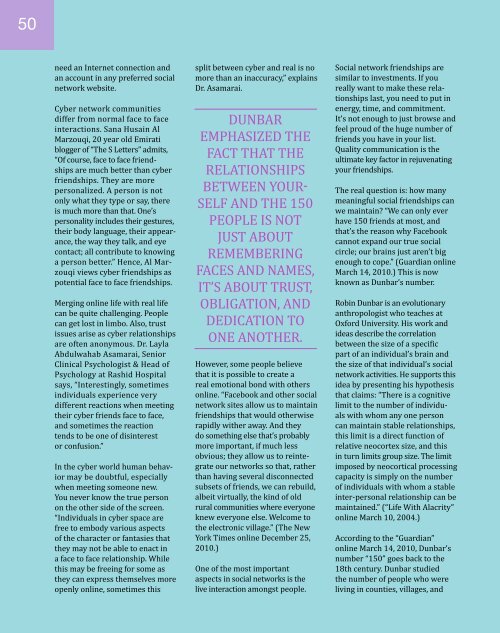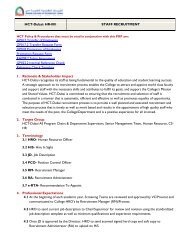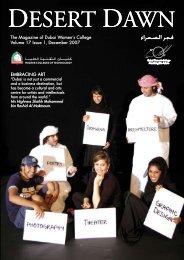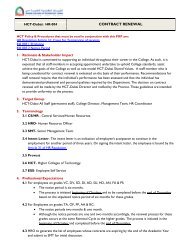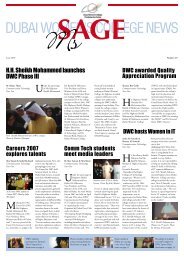The unrevealed trauma - Dubai Women's College - Higher Colleges ...
The unrevealed trauma - Dubai Women's College - Higher Colleges ...
The unrevealed trauma - Dubai Women's College - Higher Colleges ...
Create successful ePaper yourself
Turn your PDF publications into a flip-book with our unique Google optimized e-Paper software.
50 51<br />
need an Internet connection and<br />
an account in any preferred social<br />
network website.<br />
Cyber network communities<br />
differ from normal face to face<br />
interactions. Sana Husain Al<br />
Marzouqi, 20 year old Emirati<br />
blogger of “<strong>The</strong> S Letters” admits,<br />
“Of course, face to face friendships<br />
are much better than cyber<br />
friendships. <strong>The</strong>y are more<br />
personalized. A person is not<br />
only what they type or say, there<br />
is much more than that. One’s<br />
personality includes their gestures,<br />
their body language, their appearance,<br />
the way they talk, and eye<br />
contact; all contribute to knowing<br />
a person better.” Hence, Al Marzouqi<br />
views cyber friendships as<br />
potential face to face friendships.<br />
Merging online life with real life<br />
can be quite challenging. People<br />
can get lost in limbo. Also, trust<br />
issues arise as cyber relationships<br />
are often anonymous. Dr. Layla<br />
Abdulwahab Asamarai, Senior<br />
Clinical Psychologist & Head of<br />
Psychology at Rashid Hospital<br />
says, “Interestingly, sometimes<br />
individuals experience very<br />
different reactions when meeting<br />
their cyber friends face to face,<br />
and sometimes the reaction<br />
tends to be one of disinterest<br />
or confusion.”<br />
In the cyber world human behavior<br />
may be doubtful, especially<br />
when meeting someone new.<br />
You never know the true person<br />
on the other side of the screen.<br />
“Individuals in cyber space are<br />
free to embody various aspects<br />
of the character or fantasies that<br />
they may not be able to enact in<br />
a face to face relationship. While<br />
this may be freeing for some as<br />
they can express themselves more<br />
openly online, sometimes this<br />
split between cyber and real is no<br />
more than an inaccuracy,” explains<br />
Dr. Asamarai.<br />
DUNBAR<br />
EMPHASIZED THE<br />
FACT THAT THE<br />
RELATIONSHIPS<br />
BETWEEN YOUR-<br />
SELF AND THE 150<br />
PEOPLE IS NOT<br />
JUST ABOUT<br />
REMEMBERING<br />
FACES AND NAMES,<br />
IT’S ABOUT TRUST,<br />
OBLIGATION, AND<br />
DEDICATION TO<br />
ONE ANOTHER.<br />
However, some people believe<br />
that it is possible to create a<br />
real emotional bond with others<br />
online. “Facebook and other social<br />
network sites allow us to maintain<br />
friendships that would otherwise<br />
rapidly wither away. And they<br />
do something else that’s probably<br />
more important, if much less<br />
obvious; they allow us to reintegrate<br />
our networks so that, rather<br />
than having several disconnected<br />
subsets of friends, we can rebuild,<br />
albeit virtually, the kind of old<br />
rural communities where everyone<br />
knew everyone else. Welcome to<br />
the electronic village.” (<strong>The</strong> New<br />
York Times online December 25,<br />
2010.)<br />
One of the most important<br />
aspects in social networks is the<br />
live interaction amongst people.<br />
Social network friendships are<br />
similar to investments. If you<br />
really want to make these relationships<br />
last, you need to put in<br />
energy, time, and commitment.<br />
It’s not enough to just browse and<br />
feel proud of the huge number of<br />
friends you have in your list.<br />
Quality communication is the<br />
ultimate key factor in rejuvenating<br />
your friendships.<br />
<strong>The</strong> real question is: how many<br />
meaningful social friendships can<br />
we maintain? “We can only ever<br />
have 150 friends at most, and<br />
that’s the reason why Facebook<br />
cannot expand our true social<br />
circle; our brains just aren’t big<br />
enough to cope.” (Guardian online<br />
March 14, 2010.) This is now<br />
known as Dunbar’s number.<br />
Robin Dunbar is an evolutionary<br />
anthropologist who teaches at<br />
Oxford University. His work and<br />
ideas describe the correlation<br />
between the size of a specific<br />
part of an individual’s brain and<br />
the size of that individual’s social<br />
network activities. He supports this<br />
idea by presenting his hypothesis<br />
that claims: “<strong>The</strong>re is a cognitive<br />
limit to the number of individuals<br />
with whom any one person<br />
can maintain stable relationships,<br />
this limit is a direct function of<br />
relative neocortex size, and this<br />
in turn limits group size. <strong>The</strong> limit<br />
imposed by neocortical processing<br />
capacity is simply on the number<br />
of individuals with whom a stable<br />
inter-personal relationship can be<br />
maintained.” (“Life With Alacrity”<br />
online March 10, 2004.)<br />
According to the “Guardian”<br />
online March 14, 2010, Dunbar’s<br />
number “150” goes back to the<br />
18th century. Dunbar studied<br />
the number of people who were<br />
living in counties, villages, and<br />
How many meaningful social friendships can we maintain? Reem Ahli/DWC<br />
communities and concluded that<br />
the lucky number was indeed<br />
150. Dunbar emphasized the fact<br />
that the relationships between<br />
yourself and the 150 people is not<br />
just about remembering faces and<br />
names, it’s about trust, obligation,<br />
and dedication to one another.<br />
<strong>The</strong>se are the factors required in<br />
order to start a meaningful relationship,<br />
and make it count.<br />
This illustrates the importance of<br />
social networks in our daily lives,<br />
and how it has become essential<br />
to search and understand this<br />
evolution. <strong>The</strong> era of online shopping<br />
and website browsing has<br />
gone, instead is the new era of<br />
socializing with people from<br />
different parts of the world,<br />
hoping to obtain meaningful<br />
relationships. Dunbar’s number<br />
proves how much time people<br />
are willing to spend getting to<br />
know each other. (<strong>The</strong> Wall Street<br />
Journal online February 12, 2012)<br />
Nick Humphrey, a consciousness<br />
expert, believes that human<br />
beings have big brains not for<br />
the purpose of understanding<br />
the world we live in, but to<br />
understand each other.<br />
Dr. Asamarai supports the above<br />
statement by referring to the time<br />
each individual spends trying to<br />
understand oneself while learning<br />
about others at the same time.<br />
“It is not surprising to hear that<br />
our greatest quest is to understand<br />
each other,” said Dr.<br />
Asamari.<br />
It is also significant to highlight<br />
that going from one relationship<br />
to the next results in better understanding<br />
of each other as well as<br />
oneself, which eventually leads<br />
to finding true friendships that<br />
count.


